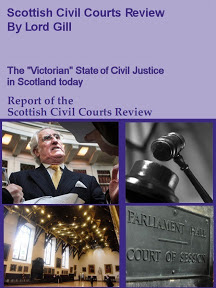 Victorian and late, Civil Courts reform will change little in Scots justice system. SEVEN YEARS after Lord President Lord Brian Gill (then Lord Justice Clerk) was commissioned in 2007 to study Scotland’s expensive closed shop civil justice system which culminated in the unremarkable 2009 Civil Courts Review conclusion that ‘things had to change’, the Scottish Government have today finally announced plans to bring the Courts Reform (Scotland) Bill to the Scottish Parliament for consideration by MSPs later this year.
Victorian and late, Civil Courts reform will change little in Scots justice system. SEVEN YEARS after Lord President Lord Brian Gill (then Lord Justice Clerk) was commissioned in 2007 to study Scotland’s expensive closed shop civil justice system which culminated in the unremarkable 2009 Civil Courts Review conclusion that ‘things had to change’, the Scottish Government have today finally announced plans to bring the Courts Reform (Scotland) Bill to the Scottish Parliament for consideration by MSPs later this year.
The much heralded Gill Civil Courts Review published in 2009 which can be viewed online here : Scottish Civil Courts Review Synopsis, Scottish Civil Courts Review Vol1 Chapters 1-9 & Scottish Civil Courts Review Vol2 Chapters 10-15 has so far impacted little on how Scots are able to access justice in the Scottish courts. At the time, Lord Gill branded Scotland’s civil justice as “Victorian” and “failing society”. Little has changed from those criticisms some seven years on.
However, many of the reforms proposed by Lord Gill in 2009 which could have helped the man on the street gain a hearing in court have unsurprisingly been opposed by the legal profession and solicitors who are concerned they will lose their long held almost exclusive rights of audience and ability to charge whatever they want for legal services.
If anything, several of Lord Gill’s key recommendations published over four years ago including those which criticised the justice system as being expensive and out of reach in 2009, are now long out of date, due to the shocking and ever rising costs of legal representation and costs of court time and services which litigants have compared being akin to “extortion charges demanded by protection rackets.”
Published today, in what is clear an attempt to take the sting of the embarrassment suffered by Justice Secretary who yesterday lost his battle to the long held safeguard of corroboration of evidence from the criminal justice system, the Scottish Government have heralded a number of changes which are claimed as a substantial improvement on what is currently nothing short of a money spinning closed shop Civil justice business model for the legal profession, and the judiciary.
The Scottish Government claims the Courts Reform (Scotland) Bill implements many of the recommendations of the Scottish Civil Courts Review, led by principal reviewer Lord Gill and commissioned in 2007. Lord Gill recommended substantial changes to modernise and improve the structure and operation of the courts, which he described in the review as ‘slow, inefficient and expensive’.
The Bill will also modernise Scotland’s courts by introducing greater specialisation and enabling more user-friendly procedures. Key provisions in the bill include:
• Increasing the threshold under which the sheriff court can deal with civil cases from £5,000 to £150,000 – freeing up the Court of Session to deal with the most challenging civil disputes. This is expected to strengthen the role of the sheriff court, while reducing costs and delays for litigants.
• Creation of a new national personal injury sheriff court, where such cases will be heard by specialist sheriffs.
• Creation of a national Sheriff Appeal Court to deal with summary criminal appeals from sheriff and justice of the peace courts, and civil appeals from sheriff courts. This will help avoid the need for some civil appeals to be heard in the Court of Session and some criminal appeals in the High Court, delivering more proportionate costs, while preserving the right to appeal to the higher courts.
• Creation of a new judicial post – the summary sheriff – to resolve lower value civil cases such as debt cases more swiftly and efficiently, while also dealing with summary criminal cases.
• Plans for specialist sheriffs and specialist summary sheriffs in areas of law such as family, housing, personal injury and commercial law, with the expertise to deal with these issues as swiftly as possible.
• New procedures for judicial review cases in the Court of Session including a three month time limit, and new procedures for appeals within the Court of Session and some appeals to the UK Supreme Court to improve efficiency.
Justice Secretary Kenny MacAskill said: “As highlighted by Lord Gill, our civil justice courts have remained relatively unchanged for more than a generation and need to be made more effective and efficient. This bill takes forward our commitment to ensure that Scotland’s civil justice system becomes more accessible, affordable and efficient for those people who need to resolve civil disputes.
He continued: “At present many lower value personal injury cases are raised in the Court of Session costing the parties a disproportionate amount and clogging up the court. In future, most of these cases will be able to be raised in the specialist personal injury court with specialist sheriffs and procedures designed to achieve settlement swiftly and at a proportionate cost to the parties. The sheriff courts are well placed to handle this transfer as the total cases coming out of the Court of Session is only around three per cent of the civil caseload in the sheriff courts.
MacAskill, who was once a High Street solicitor went on to claim: “Our reforms will help us ensure that the right cases are heard in the right places – reducing delays, cost and bureaucracy. They will also offer clearer routes to justice and more specialisation for a range of cases, from personal injury cases to family law.”
The Lord President, Lord Gill, said: “With the introduction of this Bill Scotland has the opportunity to have a civil justice system that is fit for a modern Scotland. Delay and cost have been the bane of Scottish justice for decades. These reforms will enable the courts to deliver the quality of justice to which the public is entitled. I am grateful to the Cabinet Secretary for Justice for his support for the proposals of the Scottish Civil Courts Review and for his vision in promoting this legislation.”
Which? Executive Director Richard Lloyd said: “Getting the courts working better for people must mean cases being dealt with quickly and cost-effectively. Which? supports the plans under the Courts Reform Bill to move business below the value of £150,000 in to the Sheriff Courts as this will mean more consumers will be able to seek redress for poor services or faulty goods. That will be good for consumers and good for the many businesses that play fair with their customers.”
The Scottish Government did not provide any supportive comments directly from litigants who have found it difficult to gain hearings in court, however Diary of Injustice can.
Commenting on the Scottish Government’s civil justice reform proposals, a personal litigant who has recently been charged tens of thousands of pounds for incomplete transcripts of court hearings before Scotland’s senior judges claimed the reforms do not go far enough.
He said: “It is all very well to produce press releases claiming advancements in justice but when litigants really need to use court services and find they cannot obtain legal representation, it is often the case court fees are too expensive, and of such poor quality that justice is unobtainable in the Scottish courts.”
He continued: “And even if you do have a solicitor, it will end up costing you thousands of pounds to achieve very little if anything.”
Speaking to Diary of Injustice today, a legal insider claimed the Civil Courts reforms will not serve to improve the image of Scotland’s expensive yet poor quality justice system at home or abroad.
He said: “If the Justice Secretary hopes these piecemeal reforms will attract civil cases and other business to the Scottish courts, he will be sadly disappointed.”
He continued: “London’s courts, internationally respected and much less problematic than Scotland will continue to have clear advantages over the Scots model which is after all based upon a small jurisdiction widely associated with excessive legal fees, inferior legal services, and mounting problems with its judiciary.”
BACKGROUND TO CIVIL JUSTICE REFORM IN SCOTLAND
 The Lord Justice Clerk, now Lord President, Lord Gill, author of the Civil Courts Review. The Lord Justice Clerk, Lord Gill, in his speech to the Law Society of Scotland’s 60 year anniversary conference several years ago, reproduced in full here said : “The civil justice system in Scotland is a Victorian model that had survived by means of periodic piecemeal reforms. But in substance its structure and procedures are those of a century and a half ago. It is failing the litigant and it is failing society.
The Lord Justice Clerk, now Lord President, Lord Gill, author of the Civil Courts Review. The Lord Justice Clerk, Lord Gill, in his speech to the Law Society of Scotland’s 60 year anniversary conference several years ago, reproduced in full here said : “The civil justice system in Scotland is a Victorian model that had survived by means of periodic piecemeal reforms. But in substance its structure and procedures are those of a century and a half ago. It is failing the litigant and it is failing society.
“It is essential that we should have a system that has disputes resolved at a judicial level that is appropriate to their degree of importance and that disputes should be dealt with expeditiously and efficiently and without unnecessary or unreasonable cost. That means that the judicial structure should be based on a proper hierarchy of courts and that the procedures should be appropriate to the nature and the importance of the case, in terms of time and cost. Scottish civil justice fails on all of these counts. Its delays are notorious. It costs deter litigants whose claims may be well-founded. Its procedures cause frustration and obstruct rather than facilitate the achievement of justice.”
Previous articles on the Civil Courts Review and reforms of Scotland’s antiquated civil justice system can be found on Diary of Injustice here: Scottish Civil Courts Review.





















































